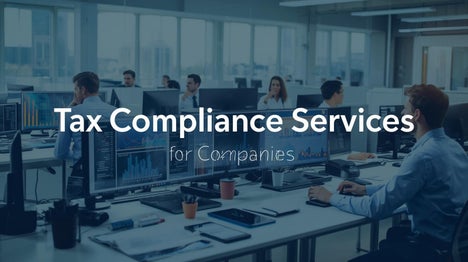In today’s complex business environment, tax compliance is one of the most critical responsibilities for any company operating in the UK. The rules and regulations governing corporate tax are constantly evolving, and businesses that fail to keep pace can face severe financial penalties, reputational harm, and even regulatory intervention. For many organisations, professional Tax Compliance Services for Companies are no longer optional—they are an essential safeguard to ensure both legal compliance and financial efficiency.
This article explains what tax compliance means in practice for companies, why it is more important than ever, what services businesses should expect from professional advisors, and how partnering with a firm like Loyals can transform compliance into a strategic advantage.
What Tax Compliance Means for Companies
At its simplest, tax compliance is the process of ensuring that all taxes owed by a company are calculated accurately, reported properly, and paid on time. But in reality, it goes far beyond ticking boxes on a form. For companies, compliance involves adhering to corporation tax rules, VAT regulations, PAYE obligations for employees, National Insurance, and other sector-specific levies. Each of these carries its own filing deadlines, payment schedules, and complex calculation rules.
For example, corporation tax must be calculated based on annual profits, adjusted for allowable deductions and reliefs. VAT compliance requires businesses to file regular returns, maintain digital records under Making Tax Digital, and apply correct VAT rates across products and services. Payroll compliance means employers must withhold the right amount of tax and National Insurance from employees’ salaries, submit Real Time Information to HMRC, and issue correct payslips and year-end forms.
The challenge for companies is not only understanding these individual obligations but ensuring they are all coordinated and managed together. A failure in one area can affect the others: miscalculating VAT can distort reported profits; payroll errors can trigger wider HMRC reviews. Effective Tax Compliance Services for Companies create a framework where all obligations are tracked, reconciled, and aligned with HMRC requirements.


The Increasing Complexity of Corporate Taxation
In recent years, tax legislation has grown significantly more complex. International operations, cross-border supply chains, and digital service delivery models have introduced new layers of compliance. The UK’s post-Brexit environment has added another dimension, with shifting customs duties, changes to VAT treatment on imports and exports, and new reporting requirements for companies trading with the EU.
Even domestic businesses that do not operate internationally are not immune from complexity. Changes to corporation tax rates, restrictions on allowable expenses, new rules on research and development relief, and evolving anti-avoidance legislation mean companies must constantly adapt. Moreover, HMRC is increasingly using data analytics to identify anomalies in returns and is quicker to launch investigations when inconsistencies appear.
For many directors, the sheer pace of change makes it difficult to keep up. That is why outsourcing or partnering with a dedicated advisor for Tax Compliance Services for Companies provides peace of mind. Instead of reacting to HMRC letters or panicking before deadlines, companies can rely on experts who monitor legislative updates, interpret their impact, and implement the necessary adjustments.
Beyond Compliance: The Strategic Value of Professional Services
It is tempting to view tax compliance as a burdensome cost—a necessary evil that must be endured to stay out of trouble. However, when approached strategically, compliance services can unlock real value.
For example, accurate corporation tax planning ensures that allowable expenses are claimed fully, reliefs such as R&D credits are maximised, and group structures are used efficiently. Proper VAT compliance can avoid overpayments and ensure timely reclaim of input VAT, improving cash flow. Effective payroll compliance builds employee trust and avoids penalties that erode morale and finances.
In short, professional Tax Compliance Services for Companies are not just about avoiding penalties; they are about optimising financial outcomes. Companies that treat compliance as part of their financial strategy often find that the service pays for itself through reduced tax liabilities, improved forecasting, and fewer operational disruptions.
Common Pitfalls Companies Face
Despite the best intentions, many businesses fall into avoidable traps. Some of the most common include late filings, incorrect treatment of expenses, misapplication of VAT rates, and incomplete record-keeping. In SMEs, where directors juggle multiple responsibilities, it is easy for deadlines to be missed or details overlooked.
The consequences can be severe. HMRC penalties are structured to escalate quickly, with fines for late returns, surcharges on late payments, and interest accumulating daily. Even a small oversight—such as forgetting to include certain employee benefits in PAYE reporting—can trigger an HMRC investigation, consuming valuable time and resources.
Professional advisors bring discipline and structure. With dedicated systems for tracking deadlines, reconciling figures, and cross-checking reports, they help companies avoid the pitfalls that come from overburdened management teams.
The Human Element in Compliance
Technology is revolutionising compliance—cloud accounting software, AI-powered expense recognition, and digital filing systems have transformed how returns are prepared. Yet, human expertise remains essential.
Legislation is full of nuance: deciding whether a cost is allowable, whether reliefs apply, or how to interpret HMRC guidance in ambiguous cases often requires judgment. Advisors combine technical knowledge with practical experience to ensure companies apply the rules correctly. A purely automated approach can miss opportunities or make costly mistakes.
That is why the most effective Tax Compliance Services for Companies integrate technology with professional oversight. Automation reduces admin and increases efficiency, while expert review ensures accuracy and strategic insight.

Your Company’s Compliance Calendar—What Happens When
One reason directors lean on Tax Compliance Services for Companies is the calendar itself. Corporation Tax has two clocks: filing and payment. Your Company Tax Return (CT600) is normally due 12 months after the end of the accounting period, but payment of Corporation Tax is usually due 9 months and 1 day after the period end—well before the filing deadline. That gap catches many teams off guard, which is why a clear timetable, reconciled to your management accounts, matters so much. GOV.UK+2GOV.UK+2
VAT runs to a different rhythm. For standard quarterly accounting, both the VAT Return and the payment are typically due one month and seven days after the period ends; if you use the Annual Accounting Scheme, deadlines differ. The result is a rolling cadence of control: monthly bookkeeping, quarter-end VAT checks, and a payment plan that assumes cash must clear HMRC on time, not just be initiated on the day. GOV.UK+3GOV.UK+3GOV.UK+3
Payroll adds a real-time layer. Under RTI, every time you pay staff you submit a Full Payment Submission; where no staff are paid in a tax month, you send an Employer Payment Submission—ideally by the 19th of the following tax month. Errors here ripple everywhere: benefits reporting, NIC reconciliations, and even VAT partial exemption where staff costs drive apportionment methods. This is precisely where a joined-up advisor prevents siloed mistakes from turning into penalties. GOV.UK+3GOV.UK+3GOV.UK+3
Sector Snapshots: Compliance in the Real World
E-commerce and multichannel retail. For online retailers, the risk is fragmented data. Marketplaces, web stores, payment gateways and returns all feed VAT and revenue recognition. The right Tax Compliance Services for Companies design a monthly close that reconciles orders, refunds, fees and shipping, applies the right VAT rate across product categories, and prepares a clean VAT return without suppressing cash flow. When your Amazon payout is net of fees and your Shopify orders include cross-border shipments, clean mapping is everything.
Construction and trades. Compliance in construction is never just Corporation Tax. It’s CIS, reverse-charge VAT on certain supplies, long projects that blur cost recognition, and subcontractor onboarding. The most effective Tax Compliance Services for Companies start with evidencing status and scope, then build job-costing discipline into monthly management accounts so that VAT, CIS, payroll and supplier terms reconcile before quarter-end.
SaaS and professional services. Here the nuance is less about inventory and more about intangibles: when to recognise revenue, how to treat software subscriptions and R&D costs, and which reliefs you can legitimately claim. Mis-timing revenue recognition can distort Corporation Tax and misstate KPIs; misclassifying software and tooling can skew capitalisation policies. A single advisory line that covers VAT, payroll options for EMI/EIS-style incentives, and annual tax works—delivered as integrated Tax Compliance Services for Companies—keeps investor updates aligned with HMRC reality. If you publish pricing globally, the team will also watch for cross-border VAT exposure and keep your UK filings clean while you scale.
From Firefighting to a Compliance Operating System
When finance teams feel they are always reacting—chasing documents at quarter-end, fixing payroll coding after the FPS went in, or discovering a Corporation Tax payment is due weeks earlier than expected—it’s a sign the operating model is missing. The cure is not more spreadsheets; it’s a lightweight compliance OS that locks three habits into place.
First, a reliable month-end: close books to an agreed day each month, reconcile bank, sales, purchase and payroll ledgers, and produce a short “exceptions” narrative. Second, a rolling cash and tax view: each month update a twelve-month tax timeline—VAT due dates, RTI submissions, Corporation Tax payment forecasts—and hold a 20-minute huddle to clear blockers. Third, evidence by default: invoices, contracts, benefit elections and VAT rate decisions are captured at source and linked to the transaction, so your files are “audit-ready” without extra effort.
How Loyals Delivers Tax Compliance Services for Companies
We recognise that compliance is not just about filing forms—it is about building confidence and security into your business operations. Our services include:
- Comprehensive corporation tax management, from calculating liabilities to filing returns
- VAT compliance and quarterly returns, ensuring digital records meet HMRC’s MTD requirements
- Payroll compliance, including PAYE submissions, National Insurance, and benefits reporting
- Ongoing advisory support to monitor legislative changes and adapt your company’s compliance strategy
- Representation in case of HMRC queries or investigations
What sets us apart is our proactive approach. Instead of reacting to problems, we work alongside clients throughout the year, offering reminders, advice, and updates. We make compliance seamless so that directors can focus on running their businesses.
Looking Ahead: The Future of Corporate Tax Compliance
The direction of travel is clear: compliance will become more digital, more integrated, and more closely monitored. Companies can expect HMRC to expand real-time reporting requirements, demand greater transparency in financial data, and leverage AI to detect inconsistencies.
For companies, this means compliance can no longer be an afterthought. Building robust systems today ensures resilience tomorrow. With expert partners, businesses can transform what seems like a regulatory burden into a source of competitive advantage, knowing their financial house is in order while competitors struggle to keep up.
Conclusion
Tax compliance is the foundation of financial stability for companies. It protects against penalties, builds credibility with stakeholders, and ensures businesses operate within the law. But beyond this, when delivered professionally, Tax Compliance Services for Companies create opportunities for optimisation, efficiency, and peace of mind.
Partnering with specialists such as Loyals means more than staying compliant—it means turning compliance into a strategic asset. For any company operating in the UK today, that is not just desirable; it is essential.


Add comment
Comments